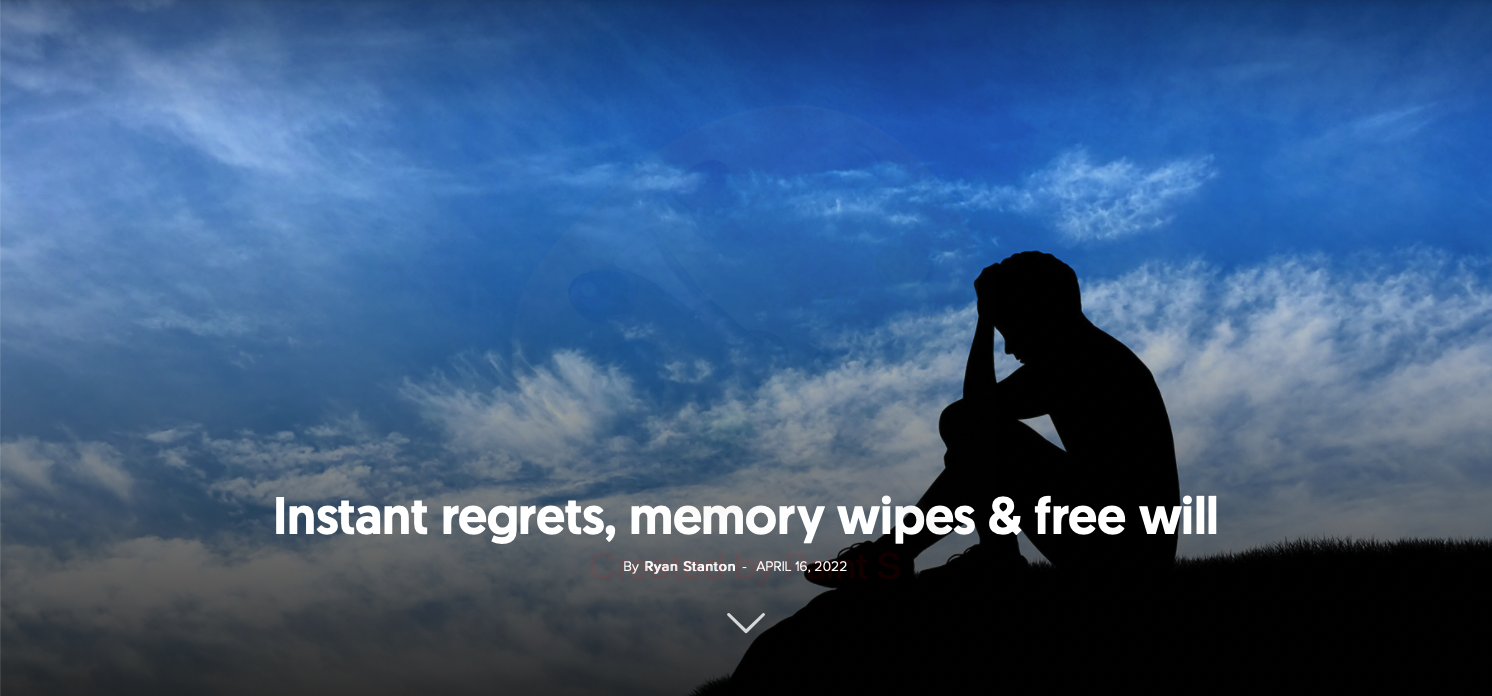What would you say if you read an article that tells you that the human ability to make choices freely and consciously—that is, free will—might just be an illusion? What if the article backs up its claims with scientific research? Such curiosity is sparked by an article published on livescience.com.
The author of the article, titled “Free will may just be the brain’s ‘background noise,’ scientists say,” directly addresses an old abstract theological and philosophical concept—that of free will—but tackles it strictly from the perspective of a neuroscience experiment—using electroencephalography (EEG) measurements.
A group of specialists from the University of California, led by Jesse Bengson, analysed the brain activity of 19 subjects while they spontaneously and consciously chose to look either right or left on a screen. It was found that before each decision to look in one of the directions, an area of their brain emitted an electrical signal about a second earlier. That was interpreted as a physiologically-based prediction of what would only appear to be free choice: “other electrical activity emanating from the back of the head predicted people’s decisions up to 800 milliseconds before the signature of conscious decision-making emerged.”
Although “purposeful intentions, desires and goals drive our decisions in a linear cause-and-effect kind of way, our finding shows that our decisions are also influenced by neural noise within any given moment,” said Bengson.
Tia Ghose, the author of the article, cites other specialists as well. Rick Addante, from the University of Texas, believes that the so-called “background noise” is irrelevant, being simply a background of the electrical activity of neurons, which specialists tend to ignore when studying the responses of the human brain to certain stimuli. Although he states that the aforementioned study “doesn’t prove or disprove free will,” Addante problematises as follows: “If there’s something else occurring before our conscious awareness that’s contributing to our decision, that raises the question about the extent of our free will.” Ali Mazaheri, from the University of Amsterdam, claims that the results of the study are a blow to true free will.
Despite contrary or hesitant opinions, the author summarises: “It’s a question that has plagued philosophers and scientists for thousands of years: Is free will an illusion? Now, a new study suggests that free will may arise from a hidden signal buried in the ‘background noise’ of chaotic electrical activity in the brain, and that this activity occurs almost a second before people consciously decide to do something.” Ultimately, the article cannot ignore the need to formulate a troubling question: “If free will is an illusion, why does it feel so real?”
How should we read articles addressing scientific topics?
A scientist declares that the experiment is not conclusive on human free will; another considers the opinion that the experiment is a blow to true free will unsubstantiated; another speaks of the influence of this “background noise” on free will; the author talks about a predetermination of free will, which makes it unfree. The final impression of the article: free will is an illusion.
Readers of such an article find themselves at an impasse, primarily because a philosophical topic is approached as if it were the most accessible object of neuroscientific study. The age or depth of a problem such as that of free will (what people accept or reject is in everyone’s power), which preoccupied thinkers like Saint Augustine in the 4th century AD[1], are not discussed at all. The theological problem of John of Damascus, who affirmed that by creating us, God made us free, is not mentioned either. Nor is there any mention of the very diverse ways in which the ability of people to make choices and decisions consciously, unconstrained by certain factors external to their consciousness, has been approached over the centuries. Not even cursory references are made, in order to show a broad cultural context, to the various types or degrees of determinism/indeterminism into which the answers given by thinkers such as Thomas Hobbes, George Berkeley, Martin Luther, Niels Bohr, Daniel Dennett, Abraham Maslow, and many more would fit.
Another source of disappointment for readers is that the simplification goes so far as to elude any moral, social, or legal implications of people’s ability or inability to freely exercise their willpower in their actions. This is because simple decisions such as looking left or right are considered equal to other decisions that would trigger moral deliberations, psychological turmoil, philosophical debates, inner monologues, and so on.
Therefore, what we are being asked to do is to believe that choosing to look to the right or left is as simple and takes as little time (almost a second) as choosing whether to study medicine or law, whether to marry, or adopt a child, whether to refuse to make a compromise or commit a crime, whether to leave the country, etc. Try to imagine Hamlet, with his famous dubitative monologue about being or not being, reduced to the chaotic background noise of his brain, and you will have no choice but to acknowledge the tone of superficiality of such a conclusion.
What the specialists observed in the experiment and called the “background noise” of the brain is the electrical activity produced one second before the subject chooses to look right or left. They concluded that that background noise “seemed to determine” the decision to look right or left. For those familiar with logical thinking it is easy to see that the reasoning is wrong; the Latin formula post hoc, ergo propter hoc[2] captures the mistake of inferring that one phenomenon was triggered by another merely because that other occurred before it. A more extensive dictionary explanation states that the fallacy is “to take a coincidence as a consequence and to consider a cause what happened merely by chance.”[3]
In addition, Bengson ventures into speculation and interpretation of observed facts using metaphorical expressions, instead of indubitable evidence: “This background noise may allow people to respond creatively to novel situations, and it may even give human behaviour the ‘flavour of free will.’” We are not told exactly what this “flavour” is, and why it is not actually free will, or the exercise of an individual’s volition to choose deliberately, according to his or her capacity to reason.
You might also enjoy reading: Instant regrets, memory wipes & free will
Popularising science and confusing readers
Unlike other forms of journalism, the one focused on science topics has some particularities that bring it more credit from readers; it is often practised by people with studies in various sciences, in addition to those of communication and journalism; it promises a detached, fact-oriented approach with as little interpretation or speculation as possible; it focuses on arguments and evidence taken from the activity of scientists, with balanced, cautious hypotheses and conclusions, with the awareness of the fallibility of the data obtained, with the modesty of provisional performances, etc. At least that’s how the media coverage of scientific research should be.
And yet, it sometimes ends up having the same flaws frequently encountered in the mass media, from tabloids to online science articles. Under promising headlines, some articles turn out to be lacking in substance, illogical or incomplete in terms of information. The aforementioned article leaves its readers with a disappointment that cannot be easily overlooked due to the stakes of the subject.
The conclusion of the article brings more nonsense, switching from the results of objective research to an absolutely subjective and ignorant explanation regarding the philosophical complexity of the problem of free will: “If free will is an illusion, why does it feel so real?” asks the author, although it is not known when she decided to prove Mazaheri right. Also in this article, an answer is given that dismisses centuries of theological and philosophical reflections: that “life would be too depressing without the illusion of choice, making it hard for humans to survive and reproduce.”
This is how a mind-boggling article is produced, from which those with logic do not retain anything clear, those who are informed remain disappointed, and those who are misinformed or inattentive may feel a “power outage” in approaching the decisions they face.
And all because of the rapid popularisation of neuroscience, a relatively recent area of research on neural networks, a cybernetic approach to brain processes, following the brain-computer analogy. Yet, ever since a few decades ago, research papers that popularised neural science contained clarifications like this one, by researcher Mariana Beliș: “Austrian mathematician Gödel demonstrated that a system cannot completely describe itself only by its own means. A metalanguage with an order of magnitude more complex than that used by the system itself is required. In other words, the brain itself cannot describe its own activity exhaustively.”[4]
Sometimes it is necessary to prove the obvious, common sense views that seem to raise our attention and consciousness in a clear, seamless way. In the present case, perhaps Gödel will give us the peace of mind to believe that there are also complex activities of the mind that will always escape rudimentary hunting by devices and tools, that the individual’s will to choose freely will not be locked away in an “insectarium” of some laboratory. Otherwise, our advanced century could come to resemble medieval times, when they removed madness from the heads of patients with pliers.
Corina Matei is a PhD associate professor at the Faculty of Communication Sciences and International Relations, part of the “Titu Maiorescu” University, Bucharest.




















